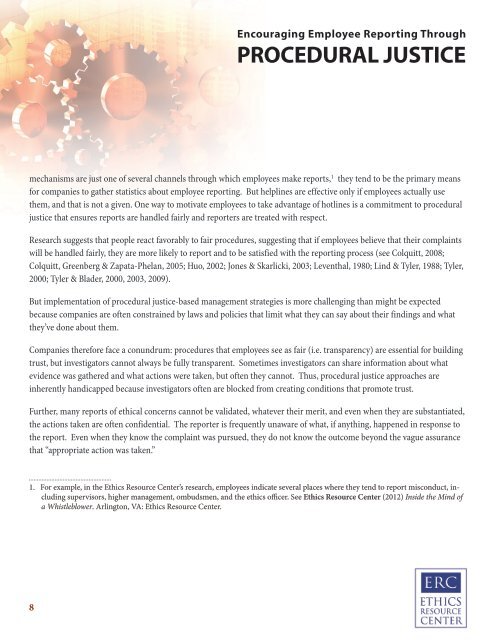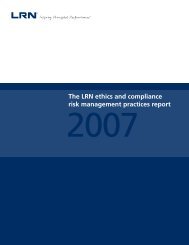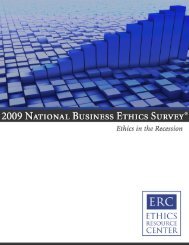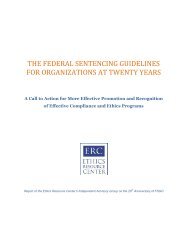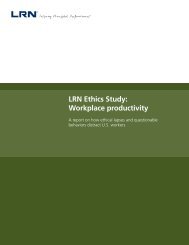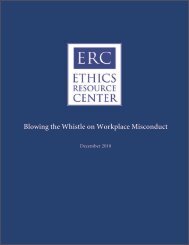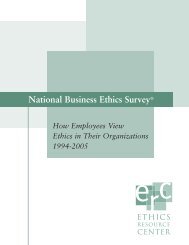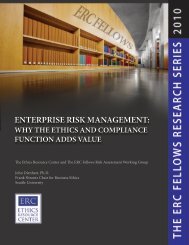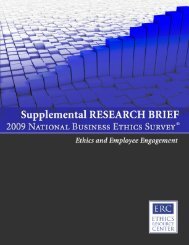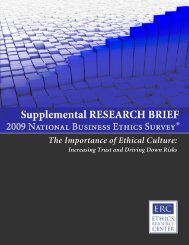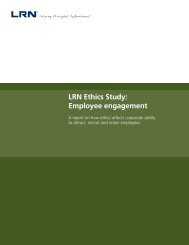PROCEDURAL JUSTICE - Ethics Resource Center
PROCEDURAL JUSTICE - Ethics Resource Center
PROCEDURAL JUSTICE - Ethics Resource Center
Create successful ePaper yourself
Turn your PDF publications into a flip-book with our unique Google optimized e-Paper software.
Encouraging Employee Reporting Through<br />
<strong>PROCEDURAL</strong> <strong>JUSTICE</strong><br />
mechanisms are just one of several channels through which employees make reports, 1 they tend to be the primary means<br />
for companies to gather statistics about employee reporting. But helplines are effective only if employees actually use<br />
them, and that is not a given. One way to motivate employees to take advantage of hotlines is a commitment to procedural<br />
justice that ensures reports are handled fairly and reporters are treated with respect.<br />
Research suggests that people react favorably to fair procedures, suggesting that if employees believe that their complaints<br />
will be handled fairly, they are more likely to report and to be satisfied with the reporting process (see Colquitt, 2008;<br />
Colquitt, Greenberg & Zapata-Phelan, 2005; Huo, 2002; Jones & Skarlicki, 2003; Leventhal, 1980; Lind & Tyler, 1988; Tyler,<br />
2000; Tyler & Blader, 2000, 2003, 2009).<br />
But implementation of procedural justice-based management strategies is more challenging than might be expected<br />
because companies are often constrained by laws and policies that limit what they can say about their findings and what<br />
they’ve done about them.<br />
Companies therefore face a conundrum: procedures that employees see as fair (i.e. transparency) are essential for building<br />
trust, but investigators cannot always be fully transparent. Sometimes investigators can share information about what<br />
evidence was gathered and what actions were taken, but often they cannot. Thus, procedural justice approaches are<br />
inherently handicapped because investigators often are blocked from creating conditions that promote trust.<br />
Further, many reports of ethical concerns cannot be validated, whatever their merit, and even when they are substantiated,<br />
the actions taken are often confidential. The reporter is frequently unaware of what, if anything, happened in response to<br />
the report. Even when they know the complaint was pursued, they do not know the outcome beyond the vague assurance<br />
that “appropriate action was taken.”<br />
1. For example, in the <strong>Ethics</strong> <strong>Resource</strong> <strong>Center</strong>’s research, employees indicate several places where they tend to report misconduct, including<br />
supervisors, higher management, ombudsmen, and the ethics officer. See <strong>Ethics</strong> <strong>Resource</strong> <strong>Center</strong> (2012) Inside the Mind of<br />
a Whistleblower. Arlington, VA: <strong>Ethics</strong> <strong>Resource</strong> <strong>Center</strong>.<br />
8


